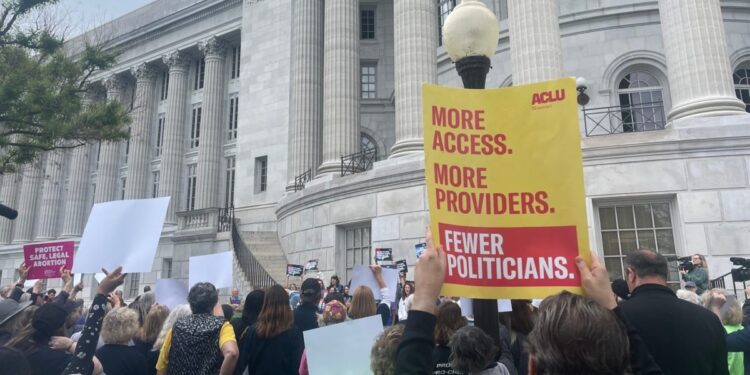On Friday night, a Missouri judge handed down a ruling that could threaten voters’ abilities to enshrine reproductive rights in the state’s constitution this November. It is a massive setback for one of most consequential abortion ballot measures this year.
After the Supreme Court overruled Roe in its June 2022 decision in Dobbs v. Jackson Women’s Health Organization, Missouri began enforcing its near-total abortion ban that had been dormant until Dobbs. Soon after, activists began pushing for a ballot measure, Amendment 3, to bring back abortion to the state. In May, organizers in Missouri turned in more than 380,000 signatures in their bid to get the proposed amendment on the ballot, compared to the 172,000 required.
The proposed amendment stipulates that the government cannot “deny or infringe upon a person’s fundamental right to reproductive freedom” and that abortion cannot be restricted in the state before fetal viability. It also says that life and health exceptions must be respected and that people cannot be prosecuted for helping someone obtain an abortion or for their own pregnancy outcomes.
On Friday, Cole County Circuit Judge Christopher Limbaugh ruled that the proposed Amendment 3 should be removed from the November ballot because it does not specify which specific anti-abortion laws it would repeal. (Advocates say that exact laws for repeal would be determined by future lawsuits.)
In his ruling, Limbaugh wrote that he “recognizes the gravity of the unique issues involved in this case” and would stay his ruling until Tuesday, “so that further guidance or rulings can be provided by a reviewing court.”
In a statement, Rachel Sweet, campaign manager for Missourians for Constitutional Freedom, the group behind the ballot measure initiative, called the judge’s decision a “profound injustice,” adding that the group plans to appeal. “Our fight to ensure that voters—not politicians—have the final say is far from over,” Sweet said.
Limbaugh’s ruling represents just the latest roadblock that Missouri reproductive rights advocates have encountered. As my colleague Madison Pauly reported, anti-abortion officials in the state stymied advocates’ attempts to bring a ballot measure to voters in 2019. As Madison chronicled, advocates also fought amongst themselves about whether the proposed ballot measure should seek to restore Roe or go beyond it:
In the months following the 2022 election, the group—a mix of advocates including the state ACLU and Planned Parenthood affiliates and the local activist group Abortion Action Missouri—splintered. Some members, including [Executive Director of Medical Students for Choice Pamela] Merritt, wanted to go with language that would enshrine a broad right to abortion. Others wanted to consider an amendment with baked-in compromises in the hopes of winning over more voters. They proposed letting the state impose or preserve restrictions that the larger abortion-rights movement often condemns, including a ban on procedures after so-called fetal viability—the hard-to-pin-down point in pregnancy at which a fetus has a decent chance of surviving outside the uterus. (Viability limits often include an exception for abortions needed to protect a pregnant patient’s life or health.)
Now, based on Limbaugh’s order, it seems they may not get anything they were hoping for.






